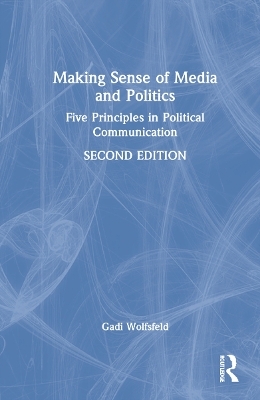
Making Sense of Media and Politics
Five Principles in Political Communication
Seiten
2022
|
2nd edition
Routledge (Verlag)
978-1-032-00993-3 (ISBN)
Routledge (Verlag)
978-1-032-00993-3 (ISBN)
In the new edition of this classic text, Gadi Wolfsfeld illustrates the five major principles needed to understand the interrelationship of media and politics.
In Making Sense of Media and Politics, Gadi Wolfsfeld introduces readers to the most important concepts for examining the interrelationship of media and politics. Five major principles are used to summarize the major arguments:
Political power can usually be translated into power over all forms of media.
When the powerful lose control over the political environment, they also lose control over all forms of media.
Every political story that appears in every form of media is biased.
All forms of media are primarily dedicated to telling good stories, which can have a major impact on political processes.
Many of the most important effects of the various forms of media on citizens tend to be unintentional and unnoticed.
By identifying these five key principles of political communication, Wolfsfeld examines those who package and send political messages, those who transform political messages into stories, and the effects this can have on citizens, and how the more active members of the public ("users") can initiate their own stories. The result is a brief, engaging guide to help make sense of the wider world of media and politics and an essential companion to more in-depths studies of the field.
New to the Second Edition
Up-to-date coverage of major political events in the last decade, including the landmark US elections of 2016 and 2020.
Devotes more attention to the "hybrid media system" that has developed over the last decade, providing a greater balance between traditional "news" and social media in particular.
Includes more cross-national research, especially in non-Western and non-democratic countries.
Refines the five principles of political communication to better reflect contemporary media trends.
Covers key emerging topics including misinformation and threats to democratic institutions, new forms of political engagement, and the economic base of the various forms of media.
In Making Sense of Media and Politics, Gadi Wolfsfeld introduces readers to the most important concepts for examining the interrelationship of media and politics. Five major principles are used to summarize the major arguments:
Political power can usually be translated into power over all forms of media.
When the powerful lose control over the political environment, they also lose control over all forms of media.
Every political story that appears in every form of media is biased.
All forms of media are primarily dedicated to telling good stories, which can have a major impact on political processes.
Many of the most important effects of the various forms of media on citizens tend to be unintentional and unnoticed.
By identifying these five key principles of political communication, Wolfsfeld examines those who package and send political messages, those who transform political messages into stories, and the effects this can have on citizens, and how the more active members of the public ("users") can initiate their own stories. The result is a brief, engaging guide to help make sense of the wider world of media and politics and an essential companion to more in-depths studies of the field.
New to the Second Edition
Up-to-date coverage of major political events in the last decade, including the landmark US elections of 2016 and 2020.
Devotes more attention to the "hybrid media system" that has developed over the last decade, providing a greater balance between traditional "news" and social media in particular.
Includes more cross-national research, especially in non-Western and non-democratic countries.
Refines the five principles of political communication to better reflect contemporary media trends.
Covers key emerging topics including misinformation and threats to democratic institutions, new forms of political engagement, and the economic base of the various forms of media.
Gadi Wolfsfeld is professor of communication and Head of the Communications and New Media MA program at the Sammy Offer School of Communication at the Reichman University (formerly IDC), Herzliya, Israel.
Preface
Acknowledgments
About the Author
Introduction
Part I – Political Actors Compete Over the Media
1. Political Power and Power Over the Media
2. Political Control and Media Independence
Part II – Turning Politics into Stories
3. Every Political Story is Biased
4. Telling a Good Story
Part III – Media Effects and Users’ Interactions
5. The Media Get You When You’re not Paying Attention
A Postscript
References
Index
| Erscheinungsdatum | 19.03.2022 |
|---|---|
| Zusatzinfo | 1 Line drawings, black and white; 1 Illustrations, black and white |
| Verlagsort | London |
| Sprache | englisch |
| Maße | 152 x 229 mm |
| Gewicht | 349 g |
| Themenwelt | Sozialwissenschaften ► Kommunikation / Medien ► Medienwissenschaft |
| Sozialwissenschaften ► Politik / Verwaltung | |
| ISBN-10 | 1-032-00993-4 / 1032009934 |
| ISBN-13 | 978-1-032-00993-3 / 9781032009933 |
| Zustand | Neuware |
| Haben Sie eine Frage zum Produkt? |
Mehr entdecken
aus dem Bereich
aus dem Bereich
wie KI und virtuelle Welten von uns Besitz ergreifen – und die …
Buch | Hardcover (2023)
Heyne (Verlag)
CHF 29,90
Eine Einführung
Buch | Softcover (2022)
Springer VS (Verlag)
CHF 46,15


